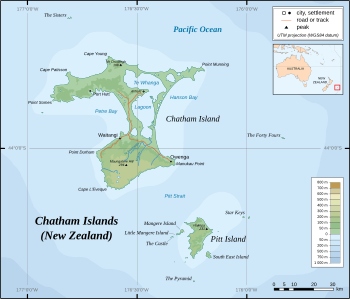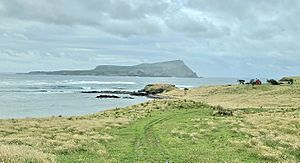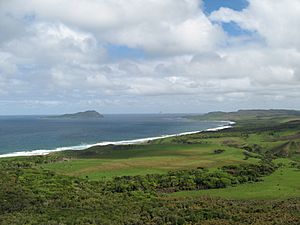Rangatira Island facts for kids

Map showing location of South East Island/Rangatira
|
|
| Geography | |
|---|---|
| Coordinates | 44°20′47″S 176°10′20″W / 44.3465°S 176.1721°W |
| Archipelago | Chatham Islands |
| Area | 2.18 km2 (0.84 sq mi) |
| Highest point | 224 |
| Administration | |
| Demographics | |
| Population | 0 |
Hokorereoro, also known as Rangatira or South East Island, is the third largest island in the Chatham Islands. This group of islands is located far to the east of New Zealand. Rangatira covers an area of about 2.18 square kilometers (539 acres).
The island is found about 800 kilometers (500 miles) east of New Zealand's South Island. It lies off the southeast coast of Pitt Island. Rangatira is also about 55 kilometers (34 miles) southeast of Waitangi, the main town on Chatham Island.
Contents
Island History and Protection
Early Visitors to Rangatira
Long ago, the ancient Moriori people had stories about visiting Rangatira. They would travel by canoe to catch birds called muttonbirds. However, there is no physical proof of these trips. We haven't found any tree carvings (dendroglyphs) or rock art (petroglyphs) left by them.
From Farms to Nature Reserve
For many years, European farmers used Rangatira Island. They raised sheep, goats, and cattle there. But in the 1960s, all these farm animals were removed. Today, Rangatira is a special nature reserve. This means it is protected, and only certain people can visit. The Department of Conservation controls who can go to the island.
Amazing Animals and Plants
Unique Creatures of Rangatira
Rangatira Island is home to many rare and special animals and plants. Some of these species are endemic, meaning they are found nowhere else in the world. The island is a safe place, or sanctuary, for endangered insects. These include the giant stick insect and the coxella weevil. You can also find the flightless rove beetle (Creophilus rekohuensis) and the Pitt Island longhorn beetle. Rangatira is also known for the Rangatira spider. This is one of New Zealand's biggest spiders!
Saving the Black Robin
Rangatira is most famous for helping to save the endangered black robin. These birds were almost completely gone. A special team, led by a man named Don Merton, worked hard to save them. They used other birds as foster parents to raise the black robin chicks. This helped the black robin population grow again.
Important Bird Breeding Spot
BirdLife International has named Rangatira an Important Bird Area. This is because many birds come here to lay their eggs and raise their young. Huge groups of broad-billed prions (330,000 pairs) nest on the island. There are also many Chatham petrels (up to 1,000 pairs) and white-faced storm petrels (840,000 pairs). For a long time, Rangatira was the only place where Chatham petrels still bred. Now, new groups of these birds are also starting to live on Pitt and Chatham Islands.
See also
 In Spanish: Isla Sudeste para niños
In Spanish: Isla Sudeste para niños
 | Aurelia Browder |
 | Nannie Helen Burroughs |
 | Michelle Alexander |



